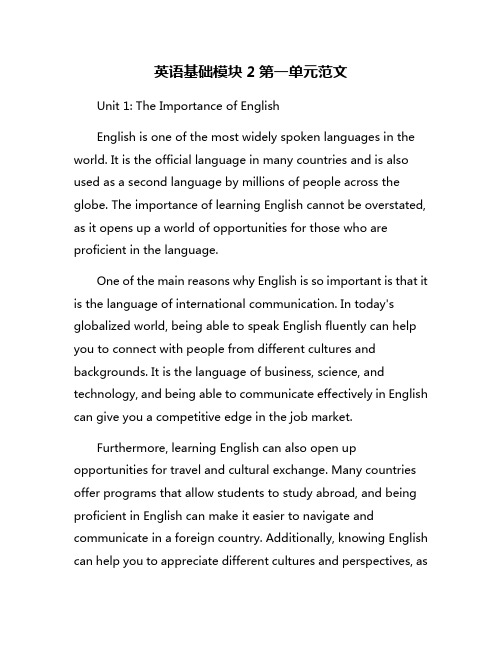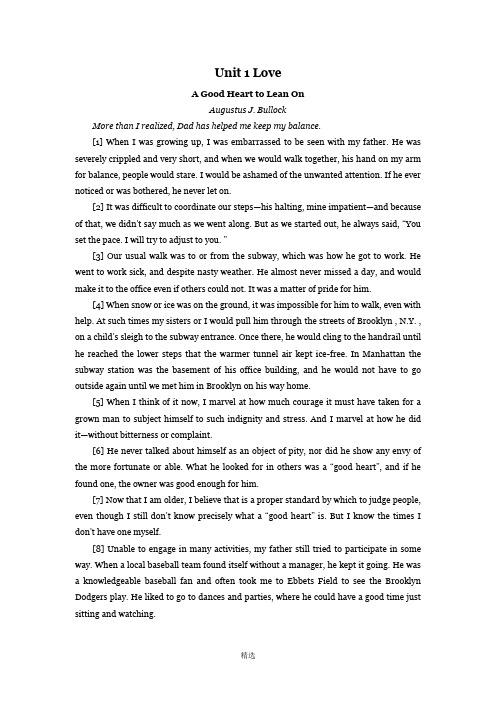英语基础模块第二版第二册Unit_1
中职国规英语基础模块第二册 Unit 1 Personal and Family教学设计方案-6课时

Unit 1 Personal and Family Life教学设计(一)第一、第二课时 Listening and Speaking一、教材分析本课教学内容选自高等教育出版社出版的“十四五”职业教育国家规划教材,《英语1 基础模块》中Unit 1听说部分,要求学生能识别个人信息,以合适的方式与他人打招呼,并能就有关个人与家庭的信息进行交流。
二、学情分析本课授课对象为中职学校一年级新生。
经过九年的义务教育,他们有一定的英语基础知识储备,但两极分化严重,一部分学生学习兴趣浓厚,能用英语较为流畅地交流;另一部分学生学习兴趣不高,有畏难情绪,不愿意开口。
因此教师对教学活动应进行合理的设计,由易到难,由简到繁,由机械模仿到替换练习,再到语言实践,逐步铺设台阶,把学生可能遇到的困难挫折降到最低。
经过前期的英语学习,学生都会说Hello./Good morning.等常见打招呼的用语,但不熟悉其使用场合的差异性;对于介绍自己和他人的常用表达有一定了解,但仍需要进一步学习。
三、教学目标1. 学生能够听懂介绍个人及家庭成员基本信息的对话,并获取关键信息;2. 学生能够理解中西方姓名表达方式上的差异,使用得体的方式称呼他人;3. 学生能够结合不同情景选用合适的方式与人打招呼,形成礼貌、得体的良好素养;4. 学生能结合所给关键信息描述人物的体貌特征、职业和工作职责等。
四、教学重点、难点分析教学重点:能在不同情境下选用合适的打招呼用语,并能简单描述家庭成员的基本信息。
教学难点:能熟练运用描述家庭成员信息和不同家庭特点的句型。
五、教学过程Step 1 Warming Up*1. 铺垫活动: Brainstorm.(1)激活词汇储备:学生说出已知的职业名称及相应工作场所的英文表达,教师可适当提供图片作为提示以激活学生思维。
(2)呈现情境:你是校园电台的一名记者,请你帮忙把Mary和Lisa介绍给大家。
为了便于介绍她们,你需要了解哪些信息?What do you want to know about him/her?提供选项:姓名、职业、工作单位、年龄、体貌特征、兴趣爱好等。
《英语》(基础模块)第二册(外语教学与出版社)教案unit1,1

I. Help the students learn the new words and expressions by reading aloud after the recorder.
II. Ask the students to listen to the conversation on page3.
科目:英语
教案
班级:数控1202、电子1202电子1201、物流1202
教师:郭池林
专业部:电子
四川省宜宾市南溪职业技术学校
201 3 —2014学年上期
第1讲
章节
标题
Unit 1 Nice to Meet You!
授课日期
课时
2
教学内容
目标
To understand the dialogue.
To master the functional sentences related to the topic.
allow, introduce, manager,England, project, equipment…
II. Ask the students to listen to the dialogue again and finish Exercise 3 on page 3.
III. Ask the students to read the dialogue in pairs and act it out.
1. When you meet someone for the first time, what will you do?
2. How do westerners usually greet each other when they meet?
英语基础模块2第一单元范文

英语基础模块2第一单元范文Unit 1: The Importance of EnglishEnglish is one of the most widely spoken languages in the world. It is the official language in many countries and is also used as a second language by millions of people across the globe. The importance of learning English cannot be overstated, as it opens up a world of opportunities for those who are proficient in the language.One of the main reasons why English is so important is that it is the language of international communication. In today's globalized world, being able to speak English fluently can help you to connect with people from different cultures and backgrounds. It is the language of business, science, and technology, and being able to communicate effectively in English can give you a competitive edge in the job market.Furthermore, learning English can also open up opportunities for travel and cultural exchange. Many countries offer programs that allow students to study abroad, and being proficient in English can make it easier to navigate and communicate in a foreign country. Additionally, knowing English can help you to appreciate different cultures and perspectives, asit allows you to access a wide range of literature, films, and music from around the world.In conclusion, learning English is essential in today's world. It can help you to communicate with people from different backgrounds, access a wealth of information and opportunities, and broaden your horizons. Whether you are a student, a professional, or simply someone who is interested in the world around you, learning English is a valuable skill that can enrich your life in countless ways.。
外研版中职国规英语教材基础模块第二册第1单元

代表发言。
学生记笔记。
过渡新课。积累语言的交流素材。
8’
热身练习
教师让学生大声一遍Warming up 的全部内容,听录音1-2两遍,完成Warming up Listen and choose.
活动:指导学生口头编问候的对话。
帮助学生掌握How are you?Nice to meet you!How do you do?及应答的正确方式。
We can get the answers tothese questionsfrom reading the following text.
While-reading:
1)Please read the text carefully and find the answers to the following questions.
预测对话内容。
检验预测正确性。
学生小组讨论,推举代表回答问题。
学生跟读。
学生分角色朗读。
学生小组研讨编对话。
学生角色表演。
学生预测。
学生自行检测。
带着问题学习,具有针对性。
语言输入。
手、口并用,帮助学生快速掌握单词与短语的含义,降低听力练习的难度。
通过泛听,了解大意。
运用关键词提升学生的听力技巧。
小组合作学习提升学生积极性,创设轻松学习氛围。
学生记笔记。
巩固刚学过的知识,衔接新课。
第2课时
教学
目标
1)掌握问候的日常用语和道别的日常用语。
2)掌握回应西方人赞扬的正确表达方式,利于与外国朋友交流。
3)会使用文中重点短语:not as … used to
So long follow some basic rules
《英语》(基础模块)(修订版)第二册第一单元

《英语》(基础模块)(修订版)第二册第一单元-CAL-FENGHAI.-(YICAI)-Company One1外研版基础模块(修订版)第二册Unit 1 Nice to meet you! 一、单元整体解读及分析二、分课时教学设计第一课时时间环节意图3’导入一、师生互动二、教师随机提问:Who was the first one yougreet in the school this morningWhat did you say教师把回答板书在黑板上。
集体回答。
个别回答。
拉近师生距离,迅速进入主题。
38’听说练习Pre-listening:1)头脑风暴:We have met many familiars. NowI will introduce a new comer David toyou. Let’s say something tohim.教师展示图片。
并把学生的回答写在黑板上。
注意书写位置要便于下一环节的归类。
已有的内容直接在板书上划出来。
2)角色扮演:教师请学生两人一组,借鉴板书上的句型,完成和David的对话。
教师把学生使用的新句型写在黑板上。
学生举手回答。
学生准备两分钟后和搭档们进行对话,教师将选择其中三组上台作“角色扮演”。
“头脑风暴”的意图有两个:一是为了让学生联想起大脑中已储存的“寒暄”句型。
为下一步的听力作准备。
二是为活动③Listenagain and act中的句型拓展作铺垫。
“角色扮演”的意图有两个:一是通过对话对听力材料进行预设,降低学生对听力练习的焦虑。
二是拓展句型,丰富活动③Listen againand act环节学生输出时的语While-listening:1)“拼图”①播放录音第一遍Tell me what you hear in the dialogue. Any word, phrase, or sentence is good.教师把学生回答的内容写在黑板上,板书时要注意有意识地按照课文顺序进行书写。
英语2(基础模块)(第2版)Unit 1课件

你的假期过得怎么样啊?
It was wonderful / great / not bad. 很精彩/很棒/不错。
We had great fun.
我们玩得很开心。
Where did your family go?
你们一家去哪儿了?
What did you do there?
你们在那里都玩了什么?
9. Think and discuss.
Yours,
Ben
10. Read and tick.
In their letters, both Ben and Bob talk about:
( ) health ( ) problems ( ) family stories
( ) school ( ) friendship ( ) travel
11. Read and tick.
Bob’s mother ● went out for her daily run ● went shopping ● slipped and hit her head
Ben’s father
□ □ ● went to the supermarket □ □ ● counted what he bought □ □ ● cooked for Ben’s mother
7. Look and talk.
Example: A: Where did you go? B: I went to Hainan. A: What was the weather like? B: It was hot. A: What did you do there? B: We went swimming. A: Did you enjoy yourselves? B: Yes, I did. It was wonderful.
Unit-1-Love新编大学英语第二版第二册课文翻译

Unit 1 LoveA Good Heart to Lean OnAugustus J. BullockMore than I realized, Dad has helped me keep my balance.[1] When I was growing up, I was embarrassed to be seen with my father. He was severely crippled and very short, and when we would walk together, his hand on my arm for balance, people would stare. I would be ashamed of the unwanted attention. If he ever noticed or was bothered, he never let on.[2] It was difficult to coordinate our steps—his halting, mine impatient—and because of that, we did n't say much as we went along. But as we started out, he always said, “You set the pace. I will try to adjust to you. ”[3] Our usual walk was to or from the subway, which was how he got to work. He went to work sick, and despite nasty weather. He almost never missed a day, and would make it to the office even if others could not. It was a matter of pride for him.[4] When snow or ice was on the ground, it was impossible for him to walk, even with help. At such times my sisters or I would pull him through the streets of Brooklyn , N.Y. , on a child's sleigh to the subway entrance. Once there, he would cling to the handrail until he reached the lower steps that the warmer tunnel air kept ice-free. In Manhattan the subway station was the basement of his office building, and he would not have to go outside again until we met him in Brooklyn on his way home.[5] When I think of it now, I marvel at how much courage it must have taken for a grown man to subject himself to such indignity and stress. And I marvel at how he did it—without bitterness or complaint.[6] He never talked about himself as an object of pity, nor did he show any envy of the more fortunate or able. What he looked for in others was a “good heart”, and if he found one, the owner was good enough for him.[7] Now that I am older, I believe that is a proper standard by which to judge people, even though I still don't know precisely what a “good heart” is. But I know the times I don't have one myself.[8] Unable to engage in many activities, my father still tried to participate in some way. When a local baseball team found itself without a manager, he kept it going. He was a knowledgeable baseball fan and often took me to Ebbets Field to see the Brooklyn Dodgers play. He liked to go to dances and parties, where he could have a good time just sitting and watching.[9] On one memorable occasion a fight broke out at a beach party, with everyone punching and shoving. He wasn't content to sit and watch, but he couldn't stand unaided on the soft sand. In frustration he began to shout, “I'll fight anyone who will sit down with me! I'll fight anyone who will sit down with me! ”[10] Nobody did. But the next day people kidded him by saying it was the first time any fighter was urged to take a dive even before the bout began.[11] I now know he participated in some things vicariously through me, his only son. When I played ball (poorly), he “played” too. When I joined the Navy, he “joined” too. And when I came home on leave, he saw to it that I visited his office. Introducing me, he was really saying, “This is my son, but it is also me, and I could have done this, too, if things had been different. ” Those words were never said aloud.[12] He has been gone many years now, but I think of him often. I wonder if he sensed my reluctance to be seen with him during our walks. If he did, I am sorry I never told him how sorry I was, how unworthy I was, how I regretted it. I think of him when I complain about trifles, when I am envious of another's good fortune, when I don't have a “good heart”.[13] At such times I put my hand on his arm to regain my balance, and say, “You set the pace. I will try to adjust to you.”善良之心,久久相依当时我没有意识到,是爸爸帮我保持平衡奥古斯塔斯• J •布洛克1 随着我渐渐长大,当别人看见我和爸爸在一起,我会觉得很尴尬。
英语基础模块2第一单元教案1.1

宁德职业技术学院教学过程与内容:Ⅰ. GreetingⅡ. Preview本单元是学生第二学期的第一单元,话题与学生的假期活动相关。
而学生刚从假期中归来,仍沉浸在假期的快乐中。
第一单元的话题非常符合学生的兴趣和当时的心情,这为本单元的学习打下了良好的基础。
第一单元的教学内容主要为:能够听懂并谈论假期中的活动;能够看懂关于家庭成员的小故事;能够描述一些已经发生过的有趣的经历;能够掌握并运用一般过去时的肯定式和否定式;能够在朗读时注意句子中的重读音节。
本单元的话题虽然亲切,教师仍然要注意运用多种教学手段,并关注每一个学生,在一些教学步骤中采用分层设计,帮助学生达成教学目标。
Ⅲ. Lead In(设计意图:把活动9的问题进行补充,多方面的问题能够让学生慢慢回忆起家庭中的各种趣事,从而会在下面的阅读中引起共鸣。
可以叫几个学生做一个简短的汇报,必定会引起其他同学的笑声不断。
本课时的教学即能在欢快轻松的氛围中展开。
)Ⅳ. Read-in1. Activity 10: fast reading. Get the Ss to read the letters as quickly as they can and tick the right topic. Then check the answer with the whole class.(设计意图,这一教学活动要求学生抓住重点,培养他们快速捕捉信息的能力。
)2. Activity 11. Read the letter again and tick the things Bob’s mother and Ben’s father did.(设计意图,找出课文中的关键活动,初步理解课文。
)3. Activity 12. Read the letters again and tick the correct sentences. Then check the answers with the Ss. See if they have any problems, help them with some important and difficult points.(设计意图,通过找出正确的句子让学生进一步理解课文,同时在与学生校对答案时看他们是否存在阅读障碍,讲解重点词组。
- 1、下载文档前请自行甄别文档内容的完整性,平台不提供额外的编辑、内容补充、找答案等附加服务。
- 2、"仅部分预览"的文档,不可在线预览部分如存在完整性等问题,可反馈申请退款(可完整预览的文档不适用该条件!)。
- 3、如文档侵犯您的权益,请联系客服反馈,我们会尽快为您处理(人工客服工作时间:9:00-18:30)。
7. Look and talk.
Harbin
cold / went skating / terrible
A: Where did you go? B: A: What was the weather like? B: A: What did you do there? B: A: Did you enjoy yourselves? B:
Yours, Bob
10. Read and tick.
Dear Family Life,
My mother is a typical housewife and she does nearly all the housework.
My father is an engineer and he never does any family chores.
11. Read and tick.
Bob’s mother ● went out for her daily run ● went shopping ● slipped and hit her head
Ben’s father
□ □ ● went to the supermarket □ □ ● counted what he bought □ □ ● cooked for Ben’s mother
10. Read and tick.
Dear Family Life, My mother is a career woman, but she never forgets her household
duties. One snowy morning, she went out for her daily run. When she returned
8. Interview and complete.
Name
Zhang Qing
Where
Beijing
Weather
cold and dry
What
climbed the Great Wall
How
wonderful
Did you have a nice holiday?
你假期过得好吗?
How was your vacation?
你的假期过得怎么样啊?
It was wonderful / great / not bad. 很精彩/很棒/不错。
We had great fun.
我们玩得很开心。
Where did your family go?
你们一家去哪儿了?
What did you do there?
你们在那里都玩了什么?
9. Think and discuss.
Last Sunday afternoon my mother was ill, and my father volunteered to
go to the supermarket for her. She gave him a shopping list with five items: 1
orange 2 eggs 3 hams 4 eggplants 5 green peppers.
Yours,
Ben
10. Read and tick.
In their letters, both Ben and Bob talk about:
( ) health ( ) problems ( ) family stories
( ) school ( ) friendship ( ) travel
12. Read and tick.
Ben’s mother is a career woman.
()
Ben’s father didn’t want to go shopping for his wife when she ( ) was ill.
Ben’s father didn’t do any housework.
“I went boating with my twin brother. Both of us had great fun.”
“I went skiing with my friends. We all enjoyed ourselves.”
3. Listen and tick.
4. Listen and answer.
7. Look and talk.
Example: A: Where did you go? B: I went to Hainan. A: What was the weather like? B: It was hot. A: What did you do there? B: We went swimming. A: Did you enjoy yourselves? B: Yes, I did. It was wonderful.
Do you help with housework at home? Who is the funniest person in your family?
10. Read and tick.
Last week we asked our readers to write us funny stories. Bob and Ben sent us very amusing family stories.
went sailing
played volleyball
went swimming
6. Listen and underline.
Li Xiaonian: Hello, Tang Hua! How was your vacation? Tang Hua: Oh, it was wonderful.
Dad returned half an hour later. He opened a large grocery bag and
started to eggs, three hams, four eggplants, and five
green peppers”. Mom and I laughed into tears!
()
13. Choose and complete.
give him a shopping list laugh into tears
be ill
start to count
volunteer to go shopping
Last Sunday afternoon, Ben’s mother _w_a_s__il_l . His father _v_o_lu__n_te_e_r_e_d__to__g_o_ _s_h_o_p_p_i_n_g_, and his mother __g_a_v_e_h_i_m__a_s_h__o_p_p_in_g__l_is_t__: 1 orange 2 eggs 3 hams 4 eggplants 5 green peppers. His father returned with a big bag and _s_t_a_rt_e_d__to__c_o_u_n_t_. In the bag there were one orange, two eggs, three hams, four eggplants, and five green peppers. Ben and his mom _l_a_u_g_h_e_d__in_t_o__te_a_r_s____.
1. What was the weather like in that place? It was very hot.
2. How was their vacation? It was great.
5. Listen and match.
Cindy
Cindy’s father
Cindy’s mother
went sailing
went skating
went fishing
2. Listen and match.
“I went swimming with my parents. It was very nice.”
“My dad and I played volleyball on the beach.”
Li Xiaonian: Where did you go? Tang Hua: I went to Harbin with my parents. We had a great week there.
Li Xiaonian: Wow! What was the weather like? Tang Hua: It was cold, but we all enjoyed the beautiful snow.
to the house, she slipped and hit her head on the driveway. I sent her to the hospital. When we arrived, the doctor asked my mom
some questions to see if she was OK. “What day is today?” he asked. Without hesitation, Mom replied, “Cleaning day.”
7. Look and talk.
A: Where did you go? B: A: What was the weather like? B: A: What did you do there? B: A: Did you enjoy yourselves? B:
Kunming
warm / went boating / great
1. Read and tick.
visited the zoo
